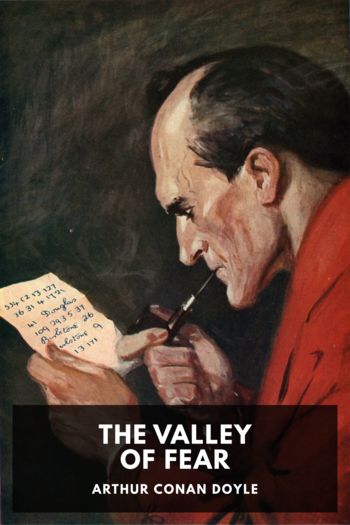The Valley of Fear - Arthur Conan Doyle (books to read in your 20s .txt) 📗

- Author: Arthur Conan Doyle
Book online «The Valley of Fear - Arthur Conan Doyle (books to read in your 20s .txt) 📗». Author Arthur Conan Doyle
As to the other denizens of the old building, it will suffice out of a large household to mention the prim, respectable, and capable Ames, and Mrs. Allen, a buxom and cheerful person, who relieved the lady of some of her household cares. The other six servants in the house bear no relation to the events of the night of January 6th.
It was at eleven forty-five that the first alarm reached the small local police station, in charge of Sergeant Wilson of the Sussex Constabulary. Cecil Barker, much excited, had rushed up to the door and pealed furiously upon the bell. A terrible tragedy had occurred at the Manor House, and John Douglas had been murdered. That was the breathless burden of his message. He had hurried back to the house, followed within a few minutes by the police sergeant, who arrived at the scene of the crime a little after twelve o’clock, after taking prompt steps to warn the county authorities that something serious was afoot.
On reaching the Manor House, the sergeant had found the drawbridge down, the windows lighted up, and the whole household in a state of wild confusion and alarm. The white-faced servants were huddling together in the hall, with the frightened butler wringing his hands in the doorway. Only Cecil Barker seemed to be master of himself and his emotions; he had opened the door which was nearest to the entrance and he had beckoned to the sergeant to follow him. At that moment there arrived Dr. Wood, a brisk and capable general practitioner from the village. The three men entered the fatal room together, while the horror-stricken butler followed at their heels, closing the door behind him to shut out the terrible scene from the maid servants.
The dead man lay on his back, sprawling with outstretched limbs in the centre of the room. He was clad only in a pink dressing gown, which covered his night clothes. There were carpet slippers on his bare feet. The doctor knelt beside him and held down the hand lamp which had stood on the table. One glance at the victim was enough to show the healer that his presence could be dispensed with. The man had been horribly injured. Lying across his chest was a curious weapon, a shotgun with the barrel sawed off a foot in front of the triggers. It was clear that this had been fired at close range and that he had received the whole charge in the face, blowing his head almost to pieces. The triggers had been wired together, so as to make the simultaneous discharge more destructive.
The country policeman was unnerved and troubled by the tremendous responsibility which had come so suddenly upon him. “We will touch nothing until my superiors arrive,” he said in a hushed voice, staring in horror at the dreadful head.
“Nothing has been touched up to now,” said Cecil Barker. “I’ll answer for that. You see it all exactly as I found it.”
“When was that?” The sergeant had drawn out his notebook.
“It was just half-past eleven. I had not begun to undress, and I was sitting by the fire in my bedroom when I heard the report. It was not very loud—it seemed to be muffled. I rushed down—I don’t suppose it was thirty seconds before I was in the room.”
“Was the door open?”
“Yes, it was open. Poor Douglas was lying as you see him. His bedroom candle was burning on the table. It was I who lit the lamp some minutes afterward.”
“Did you see no one?”
“No. I heard Mrs. Douglas coming down the stair behind me, and I rushed out to prevent her from seeing this dreadful sight. Mrs. Allen, the housekeeper, came and took her away. Ames had arrived, and we ran back into the room once more.”
“But surely I have heard that the drawbridge is kept up all night.”
“Yes, it was up until I lowered it.”
“Then how could any murderer have got away? It is out of the question! Mr. Douglas must have shot himself.”
“That was our first idea. But see!” Barker drew aside the curtain, and showed that the long, diamond-paned window was open to its full extent. “And look at this!” He held the lamp down and illuminated a smudge of blood like the mark of a boot-sole upon the wooden sill. “Someone has stood there in getting out.”
“You mean that someone waded across the moat?”
“Exactly!”
“Then if you were in the room within half a minute of the crime, he must have been in the water at that very moment.”
“I have not a doubt of it. I wish to heaven that I had rushed to the window! But the curtain screened it, as you can see, and so it never occurred to me. Then I heard the step of Mrs. Douglas, and I could not let her enter the room. It would have been too horrible.”
“Horrible enough!” said the doctor, looking at the shattered head and the terrible marks which surrounded it. “I’ve never seen such injuries since the Birlstone railway smash.”
“But, I say,” remarked the police sergeant, whose slow, bucolic common sense was still pondering the open window. “It’s all very well your saying that a man escaped by wading this moat, but what I ask you is, how did he ever get into the house at all if the bridge was up?”
“Ah, that’s the question,” said Barker.
“At what o’clock





Comments (0)